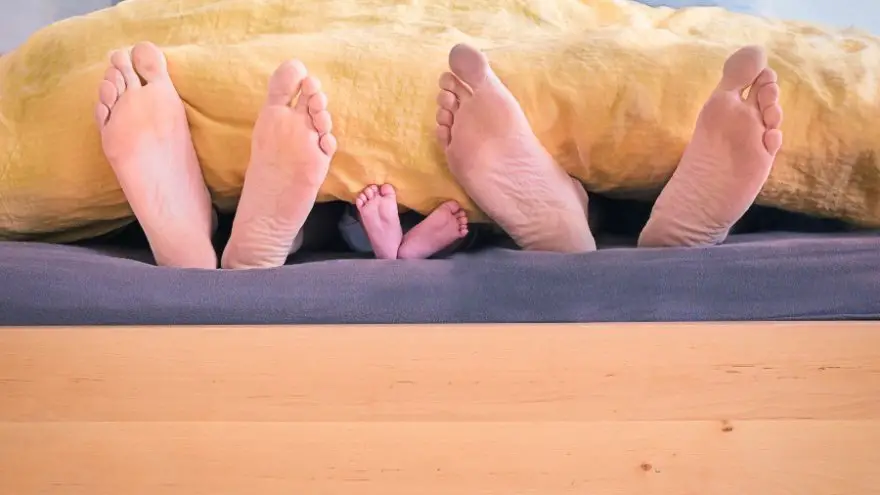Coping with Postpartum Sleep Deprivation

Your first child is here and you share all the excitement of having your baby with your family and millions of other women in the world. You have given birth, one of the most joyful and miraculous experiences of your life together. You and your spouse are planning together. You both can’t seem to take your eyes your beautiful bundle of joy. People are coming to visit and the nurses are taking your vitals and giving you the extra rest you need. The next question arises which is, have you thought about going home and the changes you are going to go through? Women often are the happiest when they are expecting because their hormones are balanced and after you give birth, be prepared to start going through many changes. These changes are both mentally and physically. The first baby is the biggest adjustment because your life now revolves against this tiny being that just eats, sleeps and cries the first six weeks of their lives. You most definitely are going to go through some sleep deprivation so be prepared. The average baby is not colicky, but you must understand that your baby could suffer from colic. This is especially hard on new parents because the baby won’t quit crying and your doctor tells you that there is nothing wrong with your newborn. Other babies seem to sleep through the night right away depending on how big they are at birth. Most babies over 8 pounds sleep better because doctors and pediatricians have said that the extra weight keeps them content for longer periods. Don’t fret if your baby is smaller, he or she will grow and end up sleeping through the night. You and your spouse should also expect that every newborn is going to have a fussy period for possible a few hours. This is their way of exercising their lungs.
What is Postpartum sleep Deprivation?
Postpartum sleep deprivation (PPD) can affect any woman during pregnancy or childbirth. Having a baby changes the way your body looks and changes your life in many ways. These changes are hard to predict and the best thing to do is to stay away from listening to negative horror stories about PPD. If you are becoming a first-time mom, talk to a health professional because every labor and baby is different. You might start to feel moody, sad, or tired, remember this is normal the first few weeks after childbirth. PPD is different.
PPD symptoms can last longer than the normal “baby blues”, and can interfere with many of your families daily activities. Common symptoms may include anxiety, headaches, irritability, and constant and nagging self-doubt about you as a mother. Here is a list of the symptoms for PPD and only your healthcare provider can decide if you are suffering from PPD. If you start experiencing any of the symptoms, you should tell your doctor right away.
- Feeling sad, hopeless, overwhelmed
- Crying more often than usual
- Worrying or feeling overly anxious
- Oversleeping or not being able to sleep when the baby sleeps
- Having trouble with concentrating and making decisions
- Frequent feelings of anger and rage
- Losing interest in activities that used to be enjoyable
- Imaginary aches and pains
- Undereating or overeating
- Avoiding friends and family
- Having trouble bonding with baby
- Self-doubt as a mother
- Thinking about harming yourself and your baby
PPD is different than “Baby Blues”
You might have heard about the “baby blues” before which affects 80% of new moms. This starts to occur a few days after childbirth, the baby blues can cause some symptoms of crying, sadness, fatigue and mood swings.
These symptoms are much less severe than those associated with PPD and usually go away within 10 days to two weeks. Baby blues do not necessarily require treatment, and up to one in four women who have the baby blues continue on to suffer from PPD.
When to get help immediately
It is very rare that a new mother may develop a severe psychological emergency called postpartum psychosis. Women with this condition may start showing symptoms of paranoia, hallucinations, confusion, and extreme irritability. These women are also a danger to themselves and to their children. They should never be left alone! Remember to call 911 immediately if you are feeling that you might be putting your baby or yourself at risk. Seek immediate emergency care from healthcare professionals. There is always help available for you.
Are some people more at risk of postpartum depression if you:
- Have a personal history of depression or bipolar disorder
- Have a family history of depression or bipolar disorder
- Do not have support from family members and friends
- Had depression problems during pregnancy
- Have a relationship and financial problems
- Younger than age 20
- Suffer from alcoholism or substance abuse
- Have a special needs child
- Have difficulty breastfeeding
- Had an unwanted or unplanned pregnancy
The United States Preventive Services Task Force recommends that healthcare providers look and ask about symptoms of depression during and after pregnancy, no matter what a woman’s risk of depression is.
 What can women do to feel better while they are seeing a doctor for postpartum depression?
What can women do to feel better while they are seeing a doctor for postpartum depression?
- Rest as much as possible
- Don’t try and be the mother of the year, ask for help
- Make time to go out, visit friends, or spend time alone with your significant other and talk about your feelings
- Join a support group
- Talk to other new mothers so you can learn from their experiences if they are positive
- Don’t make any life changes after giving birth. Major life changes in addition to a new baby could cause unnecessary stress. Occasionally these changes can’t be avoided and when this happens, try to arrange some support and help ahead of time.
It can also help to have a partner, friend or a caregiver who can assist you with household chores and taking care of your baby so you can get some rest, during your depression. As soon as you start feeling depressed after having your baby, you don’t have to suffer alone. It’s always a good idea to reach out to a loved one and call your doctor immediately.
How is postpartum sleep deprivation treated?
The common types of treatment are used for depression, however; with sleep deprivation comes depression. Here are some examples:
- Talk therapy includes talking to a therapist, psychologist, or social worker to learn coping strategies to change how depression makes you think, feel and behave. Some therapists teach crisis survival skills for tolerating painful events, urges and emotions when you can not make things better right away. This includes different skills and the easiest one to remember is to self-soothe using your five senses.
- Medication might be prescribed by a doctor or nurse for depression. There are some that are safe if you are breastfeeding and “LactMed” is available online to determine whether this medicine is safe for baby or if there are side effects.
- Electroconvulsive therapy (ECT) is used in extreme cases to treat postpartum issues.
You can use these treatments alone or together. Depression can affect everyone around you and getting treatment is important for both you and your baby. Don’t think you are a failure as a mother because you attend therapy or take an antidepressant. Getting the right help is a sign of strength so remember to talk with your healthcare professionals to determine the risks and benefits of taking medication when you are pregnant or breastfeeding.







